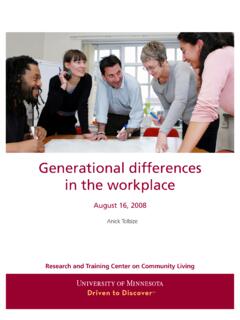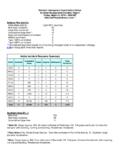Transcription of National Frontline Supervisor Competencies
1 National Frontline Supervisor Competencies April, 2013. Research & Training Center on Community Living Institute on Community Integration (UCEDD). Published April, 2013. Lori Sedlezky, Director of Knowledge Translation Authors: Jennifer Reinke, Graduate Research Assistant Sheryl Larson, Research Director Amy Hewitt, Director Research and Training Center on Community Living Institute on Community Integration (UCEDD). University of Minnesota The preparation of this paper was supported by the National Institute for Disability and Rehabilitation Research, Department of Education (Grant number 2008-2013) awarded to the Research and Training Center on Community Living, Institute on Community Integration at the University of Minnesota.
2 The opinions of the authors expressed herein do not necessarily reflect those of the Institute, University of Minnesota, or their funding sources. The University of Minnesota is an equal opportunity educator and employer. This document is available in alternative formats upon request. For alternate formats, contact . RTC on Community Living University of Minnesota 204 Pattee Hall, 150 Pillsbury Dr SE. Minneapolis, MN 55455. 612-624-6328. Recommended citation . Sedlezky, L., Reinke, J., Larson, S., & Hewitt, A. (2013). National Frontline Supervisor c ompetencies.
3 Minneapolis, MN: University of Minnesota, Research and Training Center on Community Living, Institute on Community Integration. Table of Contents What are the National Frontline Supervisor Competencies ? p. 1. Evolving role of the Frontline Supervisor p. 1. Current state of the workforce supporting people with I/DD p. 1. Overview of development process p. 2. Human service terminology used in the National Frontline Supervisor Competencies p. 3. Introduction to the National Frontline Supervisor Competencies (NFSC) p. 3. Implementation of the National Frontline Supervisor Competencies p.
4 4. National Frontline Supervisor Competencies p. 5. References p. 16. Appendix A: Competency areas included in the Minnesota Frontline Supervisor Competencies and Performance Indicators p. 17. Appendix B: National validation study executive summary p. 17. Appendix C: List of resources p. 19. National Frontline Supervisor Competencies 1. What are the National Frontline a quarter ( ) of people receiving IDD residential services live in homes that they own or lease, and, on Supervisor Competencies ? average across the United States, over half ( ).
5 The National Frontline Supervisor Competencies of people with IDD receiving residential or in-home (NFSC) are an evidence-based set of knowledge, supports live in the home of a family member (Larson, skills, and abilities that reflect best practice in the Ryan, Salmi, Smith, & Wuorio, 2012). supervision of Direct Support Professionals (DSP). who work with individuals with disabilities in residential, work, and community settings. Current state of the workforce Competencies are considered a foundation for supporting people with I/DD. workforce development and standardization in all Nationally, studies show there is between a 38%.
6 Fields and at all levels. When rigorously developed to 52% annual turnover rate of DSPs who work for and effectively implemented, Competencies serve private agencies (ANCOR, 2009; Hewitt & Larson, the important function of providing individuals 2007). Consequences of the turnover rate of DSPs information about the requirements of a given are significant, not the least of which are the cost of position and provide a basis for training, orientation, hiring and training a new DSP--estimated at $4,872. and continuing staff development. The utilization of per position (ANCOR 2009), and clear evidence that Competencies in the direct service workforce reinforces DSP vacancy rates can result in increased stress on the shared values of all service providers' skills and growth remaining workforce (Hewitt & Larson, 2007) along (Hoge, McFaul, Calcote, & Tallman, 2008).
7 Nationally with poorer services and supports for those receiving recognized and validated Competencies also serve services. to promote the recognition of the role of Frontline The growing trend towards community-based Supervisors (FLS), the development of career ladders, services results in an increased demand for DSPs to and the development of a more competent, stable be more independent in problem solving and decision- workforce to meet the growing demand of long-term making, as community-based settings offer less onsite services and supports.
8 Support from coworkers and supervisors. DSPs also face more responsibilities related to maintaining Evolving role of the Frontline professional roles and boundaries within various contexts. The significant shift in expectations from Supervisor a DSP working in congregate care environment It is the overall responsibility of an FLS to supervise to working independently in an individual's home and oversee the direct services provided to people demands an equally significant shift in the role of with intellectual and developmental disabilities (IDD).
9 The FLS (CMS, 2011b). FLSs have many roles; the tasks that a Supervisor A highly competent workforce is critical to the may be asked to do include a broad range of diverse safety and well-being of individuals with disabilities and often complex activities. These roles range who need support to live in the community. The DSP. from, hiring, training and supervising staff, program workforce has had nationally validated Competencies planning and evaluation, advocacy, working with since the development of The Community Support families, and working with community members.
10 Skill Standards: Tools for Managing Change and The role of FLSs have become increasingly more Achieving Outcomes at the Human Services Research complex based on the continued movement toward Institute (HSRI) in 1996. DSP Competencies continue to individualized services in the community (instead of be reviewed, evaluated, and revised to reflect current in group settings) and the growing service paradigm service delivery models. Typically, individuals are often placing the participant in the position of directing his promoted to the FLS role from the position of a DSP.













